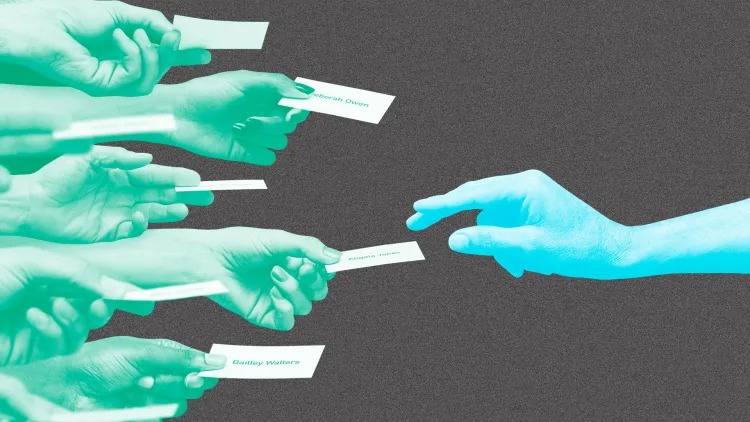- | 9:00 am
Why personal branding can feel uncomfortable. And why you need to do it anyway
It’s time to reframe the conversation around personal branding. Here are four of the top myths about personal branding, debunked.

Does the phrase personal branding fill you with dread? If so, you’re in good company.
I’ve been helping corporate leaders define their personal brands for years, and I have seen how often just the idea itself can elicit strong and negative reactions. Despite its long history and roots with management maven Tom Peters, or even when a compelling case for personal branding is made, many executives still view the concept with derision, discomfort, and doubt.
It’s not hard to see why. Culturally, we have a long legacy of discouraging individuality in the workplace. Our corporate norms dictate that we should blend in and keep our heads down, that humility at work is a virtue, and that our identities belong to our jobs and employers.
For working professionals who grew up in this paradigm, defining who we are and describing our value out loud can trigger cognitive dissonance. It feels selfish and egotistical to talk about ourselves like it’s something for the Tik Tok generation—not serious executives.
“I definitely came in carrying some ‘ick factor’ with me,” says Anna Silverstein, a senior communications leader from a global consulting firm who came to me for help with her personal brand. “The phrase ‘personal brand’ seems to exemplify everything there is to hate about the post-social media era. It sounds so transactional, commercial, shallow.”
Understandable though it is, this perspective has become outdated and problematic. Discouraging personal identities and suppressing diverse voices in the workplace has contributed to many of the systemic problems we face in corporate culture today, from burnout and depression to homogeneous C-suites and boardrooms across industries.
It’s time to reframe the conversation. To help, here are four of the top myths about personal branding, debunked.
MYTH 1: PERSONAL BRANDING IS SELFISH.
No, it’s actually an obligation. Especially as we build our careers and grow as leaders, it is up to all of us to take responsibility for knowing who we are and what matters to us, and finding the words to describe it.
“Now that I’ve done the work, I see it as a process of self-discovery and growth,” says Anna. “A brand is basically a well-designed shortcut for telling people exactly who you are and what you care about.”
If we don’t do this work, we pass the onus (and opportunity) to define what we want or need onto everyone else. That doesn’t help anyone—especially those from historically disenfranchised communities or with marginalized voices that need and deserve to be heard.
MYTH 2: PEOPLE WITH PERSONAL BRANDS ARE LOUD AND OBNOXIOUS.
Wrong. Personal branding is actually an inherently quiet and internally focused exercise. When it’s done well, defining your personal brand means taking the time to explore and define who you are, what you stand for, and what others need to know to support, benefit from, and work well with you. It should feel quiet, thoughtful, and authentic.
Ultimately, how you implement your brand is up to you. Some people choose to build a thought leadership platform or become an influencer, but for most, it is simply about becoming more deliberate interacting with others as you build your career.
MYTH 3: PERSONAL BRANDING IS FAKE AND DISINGENUOUS.
Not when it’s done well. Defining your brand is about looking at who you’ve always been and how it has manifested throughout your entire journey, your experiences, your value, and the unique way you move through the world.
When I work with executives, one of the best tactics to unlock this insight is to look at early interests and aspirations and track how they evolved. One woman, a crisis communications advisor based in Canada, remembered her childhood dream of becoming Leonardo Da Vinci. She recalled how she loved the blend of art and science in Da Vinci’s work.
Though she never made it into a science field, and she ultimately dropped out of art school, what she started to see was how the blend of art and science continues to characterize the way she approaches the world. Her clients value the way these two perspectives come together in her work, and she has discovered a creative and authentic way to describe how she operates and why.
MYTH 4: BRANDING IS ONLY FOR SENIOR LEADERS AND C-SUITE EXECUTIVES.
Definitely not. Personal branding can benefit everyone at all stages in their career journey by keeping us connected to what really drives us, where we offer the most value, and where we are trying to go. Having this knowledge will make it easier for others to help support you, throughout your career path.
“You need that clarity for any number of things, whether that’s to take the next big leap in your career, to supercharge a learning journey, or to make choices that will give your life more meaning,” says Anna.
Regardless of their role, industry, or experience level, people with a strong personal brand tend to be centered, intentional, and real. More importantly, encouraging their people to spend the time to understand their individual strengths, style, and value can help cultivate authentic leadership and greater space for diverse perspectives and personalities to thrive.







































